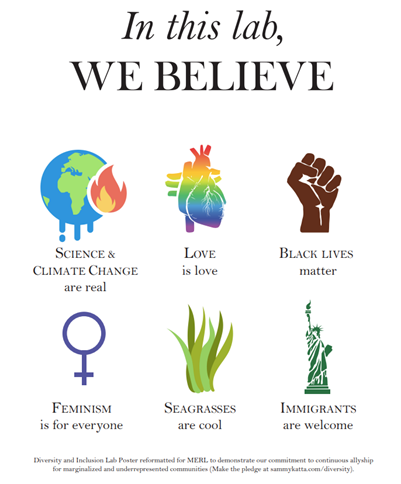MERL Inclusive Culture
Our Inclusive Culture
In our lab, we understand that a diverse set of experiences and perspectives are key to creative and productive research. We understand that collaborations built on centering historically excluded perspectives are critical to advancing science and society as we experience the catastrophic impacts of climate change. Our pursuit of knowledge must be beyond colonial ways of knowing. We acknowledge the current and historic oppression experienced by Black, Indigenous, and People of Color and denounce the culture of white supremacy that has benefited white people at the direct expense of peoples who are not white or not white presenting. We acknowledge that people with different backgrounds will experience marine science courses and research opportunities differently, and that they will face different barriers to full inclusion, equity, and success, which we must work to understand and dismantle to provide equitable access to all.

We acknowledge the realities of bias and assumptions taken for granted that uphold white supremacy (even if unintentionally). We commit to speaking out against statements that are racist and oppressive, and act in support of movements and communities seeking equality and reparations.
To develop an inclusive culture and foster belonging
As PI I will:
Create Brave Spaces
Foster a lab environment where members feel safe asking for help, sharing their needs and working collaboratively. To do so, I value a dialogic relationship rather than a unidirectional didactic model, in other words meaningful dialogue rather than dictating of tasks.
Regular Discussions
Commit to regularly discussing our lab norms, progress, and re-commitment to an inclusive culture with the lab team. To do so, I value dialogic relationships as a group and self-reflection as a true pathway to understanding, empathy, and respect and will therefore coordinate activities within the lab that allow this
Break Down Barriers
Actively pursue my own knowledge about racial justice and systemic discrimination against marginalized communities so that I may break down the barriers to success faced by historically excluded groups.
Emphasize Cultivation of Self
Intentionally craft an experience for each student that emphasizes the cultivation of self rather than contribute to a culture of data productivity.
Adopt Growth-Mindsets
Open and Engaging
Holistic Recruitment
Recruit new lab members based on holistic evaluation, which includes lived experience as expertise.
Address Equity
In our lab we will:
Break Down Antiquated Structures
Open and Engaging
Educate Ourselves
Feedback to the PI
Work Collaboratively
Outreach and Partnerships
Honor
LAND ACKNOWLEDGMENT
Stockton University is located on the traditional unceded territory of the Lenni-Lenape,
called “Lenapehoking.” We pay respect to Indigenous people throughout the Lenape
diaspora – past, present, and future – and honor those who have been historically
and systemically disenfranchised. We also acknowledge that Stockton University, like
New Jersey and the United States as a nation, was founded upon the exclusions and
erasures of Indigenous peoples. These Indigenous people, many of whom lost their
lives to genocide, were forced to leave their land. We recognize the historical and
continuing impacts of colonization on Indigenous communities, their resilience in
the face of colonial and state sponsored violence, and fully support Indigenous Sovereignty.
https://native-land.ca/

